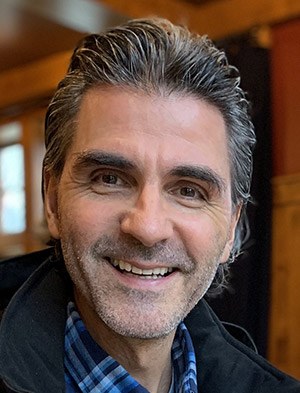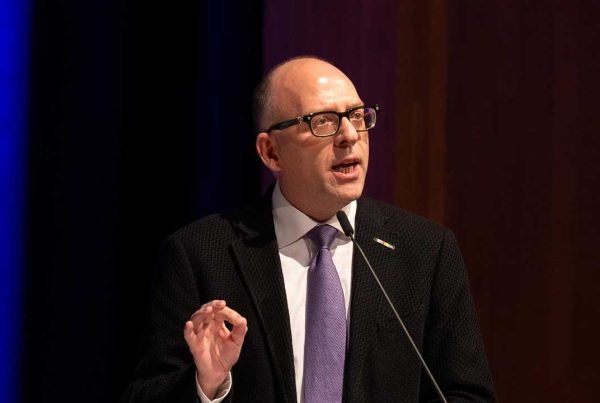 Prof. Matthias Beier, Associate Professor of Pastoral Theology and Mental Health Counseling at CTS, was recently featured in the Indiana Counseling Association’s (ICA) monthly newsletter for his service to the organization and his ongoing scholarship and teaching.
Prof. Matthias Beier, Associate Professor of Pastoral Theology and Mental Health Counseling at CTS, was recently featured in the Indiana Counseling Association’s (ICA) monthly newsletter for his service to the organization and his ongoing scholarship and teaching.
The ICA is the Indiana branch of the American Counseling Association, the world’s largest organization for counselors. Prof. Beier has been a member of the ICA since 2014, and he served as Legislative Chair on its Executive Board from 2014-2017.
In the feature, Prof. Beier talked about his journey to the field of counseling and his passion for social justice. In the newsletter, he explained, “I came to the field of counseling while I was working as a pastoral intern in a religious congregation in Germany and felt simply unprepared by my seminary training for the number of parishioners that seemed to present with symptoms of depression and anxiety. I grew up as a Turkish-German in Germany, and at the time I was looking for resources on how to address the psychological needs of parishioners as well as my own experience of oppression as a minority in Germany.” He added that this led him to the work of German author and speaker Eugen Drewermann, who found in the Christian story a message both therapeutic and socially liberative.
He told the ICA that what excites him most about counseling is “the combination of the focus on mental health and social advocacy,” which, he said, “mirrors the message that I first discovered from Eugen Drewermann.” He continued: “I love that the counseling field refuses to reduce clients to a pathologizing, medical model, and instead takes a developmental approach to client assessment and client care.”
Prof. Beier sat down with us to further unpack his distinctive perspective on counseling. He explained, “I understand counseling, whether individual, couple, family, or group counseling, as a process to facilitate liberation from deep-seated existential and relational fears, from internalized messages that one does not matter, is unlovable, incapable, not good enough.” This, he said, “involves healing and liberation.” He continued, “mental health counseling upsets internal and external power dynamics that are stacked up against oneself or a marginalized group one is part of. It is a form of empowerment against personal and social forces that threaten to extinguish a person’s or marginalized group’s voice, breath or spirit.”
Prof. Beier said that he found in Eugen Drewermann’s “therapeutic liberation theology” an emphasis on “the uniqueness of Jesus’s message that is both healing and liberating, that both are sides of the same coin.” He explained that Drewermann’s work has been important for him personally, practically, and theoretically: “I believe that the intersection of healing and liberation is the experience of mattering. In our current time,” he continued, “this is poignantly expressed in the language and action of the Black Lives Matter movement.”
According to Prof. Beier, “the absolute foundation of mattering found in anti-oppressive faith in God has fueled many liberation movements, explicitly or implicitly, including the civil rights movement.” However, he is quick to acknowledge, “the very idea of God can and so often has been rendered impotent and viciously harmful.” This problem lies at the heart of his academic work: “Understanding and deconstructing the perversion of faith and theology in the service of oppression based on absolute fears is at the heart of my scholarship and teaching. My book A Violent God-Image and my articles provide criteria for distinguishing between harmful, oppressive, and healing, liberating faith – and how to take fear- and hate-filled projections into the divine back out of it. In my teaching, I encourage students to pay close attention to psychospiritual and social dynamics of ultimate mattering in counseling and cultural work and to empower those they will work with.” This orienting concern is also at the center of his forthcoming book, God without Delusion, which, he said, offers “a way to recover faith from fear, moralism, and harmful projections into conceptions of God.”
Prof. Beier reflected on his experience as a member of the CTS faculty and the natural fit that the seminary has been for his scholarship and teaching. “CTS is an ideal context to combine work toward mental health and social advocacy,” he said, “because its MDiv program is theologically social-justice oriented while also deeply attuned to the whole person, and because CTS is a leading seminary offering social-justice oriented counseling degrees.”
Learn more about CTS’s Mental Health Counseling and Marriage and Family Therapy degrees.





